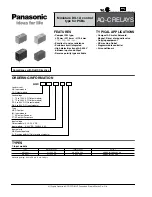
BE1-CDS220
Testing And Maintenance
13-59
3.
Apply nominal current to phase A for 7 cycles (117 ms at 60 Hz). A BF trip should
occur. Use the RS-LGC command to retrieve an SER report and verify that a BF trip
was logged 100 milliseconds ±0.5 percent or +1¼, -¼ cycles, whichever is greater
Step 6.
(Optional) Remove the wetting voltage from relay input IN3. This blocks the breaker fail logic.
Apply nominal current to phase A. Verify that relay outputs OUT1 and OUT2 open and remain
open (BF element does not operate) in spite of pickup current being applied. Apply the wetting
voltage to relay input IN3 and verify that OUT2 (and subsequently OUT1) closes. Remove
current from phase A.
Step 7.
(Optional) Apply nominal current to phase A. OUT2 and OUT1 should close. Remove the
wetting voltage from relay input IN4 and verify that OUT1 and OUT2 open. Remove current
from phase A.
Step 8.
Apply wetting voltage to relay input IN4 and nominal current to the phase A current input.
Measure the time between the application of current and OUT1 closing. OUT2 should have
closed immediately when current was applied. Verify that the BF timer operated within the
specified accuracy of ±0.5 percent of setting or +1¼, -¼ cycles, whichever is greater.
Step 9.
(Optional) Repeat Steps 3 through 8 for the phase B and phase C elements.
Virtual Switch Verification (43/143/243/343/443/543/643/743)
To test the virtual switches, we verify each mode of operation but do not verify each of the eight virtual
switches. In your testing, you may substitute any or all of the switches as you choose. If you give an
invalid command such as CS-243=1/CO-243=1 when switch 243 is programmed for mode 3 operation, the
relay will not operate on the command and if you were using the ASCII command interface, the monitor
would return an INVALID PARAMETER. For more information on virtual switch operation, see Section 4,
Protection and Control Functions, Virtual Switches.
You may verify operation of virtual switches by
monitoring the programmed output contacts, by monitoring the front panel interface screen \CTRL\xx, or
by using the RS-LGC command to retrieve logic variable data from the SER. You may also use the RG-
STAT command. See Section 6,
Reporting and Alarm Functions
for more information on reports.
Virtual Switch Mode 1 Operation (On/Off/Pulse)
Purpose
: To verify virtual switch Mode 1 operation.
Reference Commands:
SL-43, CS/CO-43
Step 1.
Prepare for Mode 1 testing by transmitting the commands in Table 13-62 to the relay.
Table 13-57. Mode 1 Test Commands
Command
Purpose
A=
Gain write access
SL-N=NONE
Zero out custom logic settings. Overwrite with
logic = none settings.
Y
Confirm overwrite
SL-N=MODE1
Sets MODE1 as custom logic name
SL-43=1
Sets 43 to Mode 1 operation
SL-VO1=43
Enables OUT1 to close for 43
EXIT
Exit
Y Save
settings
Step 2.
Prepare to monitor the virtual switch operation.
Step 3.
Transmit the commands in Table 13-58 to the relay or, if the optional HMI is supplied, navigate
to screen \CTRL\43\43 to set the mode of the 43 switch to the TRUE state (logic 1).
Result:
OUT1 contact closes and remains closed.
Summary of Contents for BE1-CDS220
Page 2: ......
Page 10: ...viii Introduction BE1 CDS220 This page intentionally left blank...
Page 36: ...ii Quick Start BE1 CDS220 This page intentionally left blank...
Page 48: ...ii Input And Output Functions BE1 CDS220 This page intentionally left blank...
Page 66: ...iv Protection and Control BE1 CDS220 This page intentionally left blank...
Page 112: ...ii Metering BE1 CDS220 This page intentionally left blank...
Page 116: ...5 4 Metering BE1 CDS220 This page intentionally left blank...
Page 166: ...ii BESTlogic Programmable Logic BE1 CDS220 This page intentionally left blank...
Page 176: ...7 10 BESTlogic Programmable Logic BE1 CDS220 This page intentionally left blank...
Page 234: ...8 56 Application BE1 CDS220 This page intentionally left blank...
Page 236: ...ii Security BE1 CDS220 This page intentionally left blank...
Page 240: ...9 4 Security BE1 CDS220 This page intentionally left blank...
Page 242: ...ii Human Machine Interface BE1 CDS220 This page intentionally left blank...
Page 256: ...10 14 Human Machine Interface BE1 CDS220 This page intentionally left blank...
Page 258: ...ii ASCII Command Interface BE1 CDS220 This page intentionally left blank...
Page 422: ...14 32 BESTCOMS Software BE1 CDS220 This page intentionally left blank...
Page 424: ...ii Time Current Characteristics BE1 CDS220 This page intentionally left blank...
Page 452: ...ii Terminal Communication BE1 CDS220 This page intentionally left blank...
Page 456: ...C 4 Terminal Communication BE1 CDS220 This page intentionally left blank...
Page 458: ...ii Settings Calculations BE1 CDS220 This page intentionally left blank...
Page 475: ......
















































